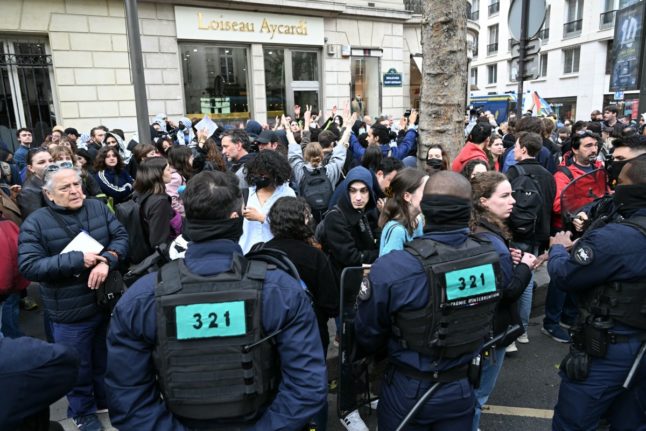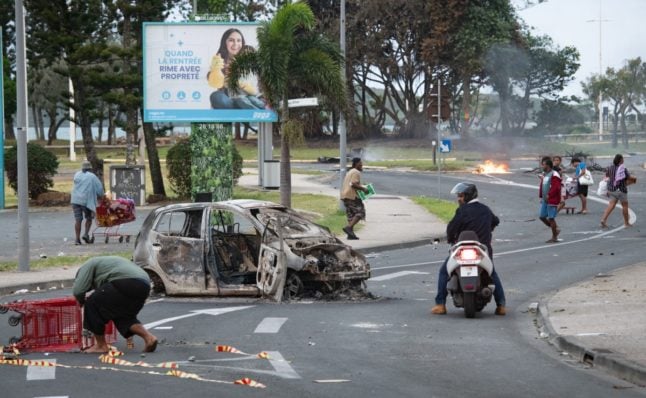Demonstrations have struck education institutions in several French cities in recent weeks, echoing the mass Gaza protests that have led to clashes in US universities.
One protester at elite school Sciences Po, who identified himself as a representative of the students’ Palestine Committee named Hicham, said university authorities had given the group 20 minutes to leave before the forcible evacuation because of “exams to be held from Monday”.
The Paris police headquarters said that “91 people were removed without incident,” while Prime Minister Gabriel Attal’s office said such protests would be dealt with using “total rigour”.
Sciences Po interim administrator Jean Basseres said he was “conscious of the significance of this difficult decision and the emotion it could spark”, adding that “multiple attempts at dialogue did not allow us to avoid it”.
The university closed its main buildings on Friday in response to the sit-in and called for remote classes instead.
After the evacuation, around 300 people demonstrated on the Pantheon square around 1.5 kilometres (just under one mile) from the university in response to a call from student unions.
“I’m very moved by what’s going on in Palestine,” said Mathis, 18, a music student at the nearby Sorbonne university who asked not to give his surname.
Eric Coquerel, a senior lawmaker for the hard-left France Unbowed (LFI) party, said the “the government must accept young people mobilising”.
“Instead, they often criminalise, caricature or slander them,” he said.
‘Disappointing’
Sciences Po, widely considered France’s top political science school, with alumni including President Emmanuel Macron, has seen student action at its sites across the country in protest against the war in Gaza and the ensuing humanitarian crisis.
Protests have been slow to spread to other prominent universities, unlike in the United States — where demonstrations at around 40 facilities have at times spiralled into clashes with police and mass arrests.
Demonstrations have so far been more peaceful in France, home to the largest Jewish population outside Israel and the United States and to Europe’s largest Muslim community.
The University of California, Los Angeles, announced that Friday’s classes would be held remotely after police cleared a protest camp there and arrested more than 200 people.
Sciences Po administration took the same step for its Paris student body of between 5,000 and 6,000.
Protesters had occupied the entrance hall in a “peaceful sit-in” following a debate on the conflict with administrators on Thursday morning that their Palestine Committee dubbed “disappointing”.
Administrator Basseres refused student demands to “investigate” Science Po’s ties with Israeli institutions.
Protests in major cities
The latest war in Gaza began after Palestinian militant group Hamas launched an attack on Israel on October 7 that resulted in the deaths of 1,170 people, mostly civilians, according to an AFP tally of Israeli official figures.
Israel estimates that 129 hostages seized by militants during their attack remain in Gaza. The Israeli military says it believes 34 of them are dead.
Israel’s relentless retaliatory offensive on Gaza has killed at least 34,622 people in the Palestinian territory, mostly women and children, according to the besieged enclave’s Hamas-run health ministry.
Outside the Sorbonne University, a few hundred metres (yards) from Sciences Po in central Paris, members of the Union of Jewish Students in France (UEJF) set up a “dialogue table” on Friday.
“Jewish students have their place in this dialogue,” said Joann Sfar, a comic-book artist invited as a guest speaker.
“I understand why students outraged by what’s going on in the Middle East are radical” but “I’m reassured as soon as I see ‘human’ dialogue,” he added.
Sciences Po sites in the French cities of Le Havre, Dijon, Reims and Poitiers have all seen disruption, blockades or occupations.
Police also removed students from the Institute for Political Studies (IEP) in Lyon.
Around 100 students had occupied a lecture hall at Science Po’s branch in the southeastern city late on Thursday.
Law enforcement on Friday removed a dozen students who were blocking the entrance to a university site in nearby Saint-Etienne.
And in the northeastern city of Lille, police broke up a student blockade of the ESJ journalism school and deployed outside the nearby Sciences Po building, allowing exams to go ahead, an AFP reporter saw.



 Please whitelist us to continue reading.
Please whitelist us to continue reading.
Member comments